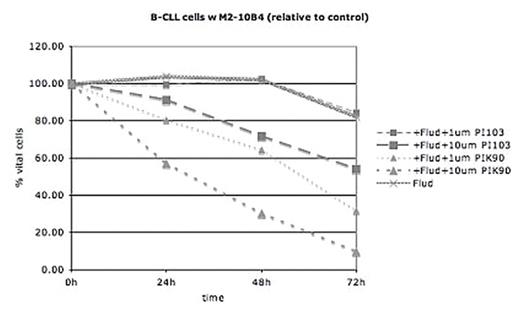Abstract
Nontumoral accessory cells such as marrow stromal cells (MSC) or nurselike cells (NLC), which constitute the leukemia microenvironment, constitutively secrete the chemokine stromal cell-derived factor-1 (SDF-1/CXCL12). CXCL12 transduces signals via its receptor CXCR4, which is expressed at high levels by Chronic Lymphocytic Leukemia (CLL) B cells. Via the CXCL12-CXCR4 axis, CLL cells migrate and adhere to stromal cells. Adhesion to stromal cells protects CLL cells from spontaneous and drug-induced apoptosis in a contact-dependent fashion. Signaling pathways regulating these processes in CLL B cells are largely unknown. Here, we examined the importance of phosphatidyl-inositide 3-kinases (PI3-K) for migration and viability of CLL B cells using non-specific and isoform-specific PI3-K inhibitors. The importance of PI3-K for migration of CLL cells to CXCL12 was determined by transwell chemotaxis and pseudoemperipolesis (PEP) assays. Inhibition of PI3-K resulted in a significant reduction of CLL cell migration in chemotaxis and PEP assays. In comparison to untreated CLL cells, Ly 294002 inhibited chemotaxis to 65 ± 4.6% of untreated controls. Using a panel of isoform-specific PI 3-K inhibitors (PI-103, PIK-90, IC87114, TGX-115, ZK-75), we observed inhibition of chemotaxis by the multi-targeted compounds PI-103 (51.4 ± 0.2%) and PIK-90 (57.5 ± 8.9%), whereas p110beta and delta inhibition had no effect. We conclude from this part of the study that PI3-kinases play an important role for CXCR4 signaling in CLL B cells, mediating migratory responses and protection from apoptosis. Experiments with inhibitors of PI3-K with higher target selectivity suggest a dominant role for the class I PI3-K p110alpha for migration in response to CXCL12. Because adhesion to stroma mediates protection from chemotherapeutic drugs, we tested PI3-K inhibitors alone and in combination with fludarabine in CLL-stroma co-cultures. Pre-treatment of CLL cells with the PI3-K inhibitors Ly 294002, PI-103, and PIK-90 resulted in a significant decrease in viability of CLL cells co-cultured with and without stroma. Moreover, PI3-K isoform specific inhibitors enhance the cytotoxicity of Fludarabine and partially reverse the protective effect of stromal cells on fludarabine-induced apoptosis. Collectively, this study establishes that PI3-Ks play an important role in CXCR4 signaling for CLL cell migration and adhesion to stromal cells. New, isoform-specific PI3-K inhibitors enhance the cytotoxicity of fludarabine in suspension cultures and in co-cultures with stromal cells. Therefore, the therapeutic potential of PI3-K inhibitors alone or in combination with fludarabine should further be investigated.
Figure.
Author notes
Disclosure: No relevant conflicts of interest to declare.


This feature is available to Subscribers Only
Sign In or Create an Account Close Modal